
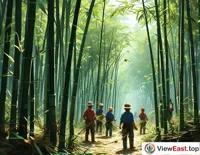
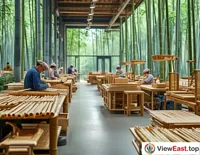
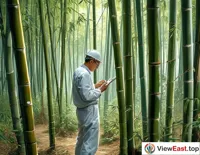
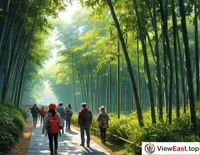

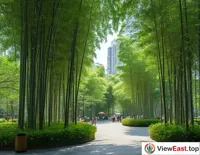

In China, there is a plant that plays an increasingly vital role in the global carbon sinks—the bamboo. The bamboo forests in China are not only picturesque natural landscapes but also green warriors against climate change. This article will comprehensively showcase the significant role of China's bamboo forests in the global carbon sinks and the achievements China has made in this regard.
The Whisper of Bamboo Forests: The Beginning of Carbon Sinks
The story begins with China's abundant bamboo resources. Bamboo, a plant with vigorous vitality and rapid growth, has a long history of cultivation in China. Amidst the intensification of global climate change, bamboo forests have gained attention for their powerful carbon sequestration capabilities. The expansion of bamboo forests in China is not only a continuation of traditional agriculture but also an enhancement of the country's contribution to the global carbon sinks.
The Green Great Wall: The Expansion Course of Bamboo Forests
The expansion of China's bamboo forests can be likened to a green great wall, protecting the environment while mitigating climate change. Since the late 20th century, China has implemented large-scale bamboo planting programs aimed at increasing the country's carbon sink capacity through expanding bamboo areas. These bamboo forests not only beautify the environment but also provide economic income for local residents.
The Power of Carbon Sinks: The Carbon Sequestration Capacity of Bamboo Forests
Bamboo forests play a significant role in the global carbon sinks due to their remarkable carbon sequestration abilities. Bamboo grows rapidly and has a large biomass, capable of quickly absorbing carbon dioxide from the atmosphere and storing it within the plant. China's bamboo forests, with their vast area and rapid growth, have become one of the most effective carbon sinks on Earth.
The Win-Win of Ecology and Economy: The Multiple Benefits of Bamboo Forests
The expansion of China's bamboo forests not only contributes to the global carbon sinks but also brings multiple benefits to local economic development. Bamboo forests provide a wealth of bamboo resources for construction, furniture manufacturing, and craft production. Additionally, bamboo forests offer habitats for wildlife, promoting the development of eco-tourism and achieving a win-win situation for ecological protection and economic development.
International Cooperation and Sharing: The Global Impact of Bamboo Forests
China's role in the global carbon sinks extends beyond its borders. China actively shares its experience in bamboo planting and management with the international community, promoting bamboo planting techniques worldwide through international cooperation projects. China's bamboo forests have become a model for global carbon sink cooperation, contributing Chinese wisdom to global climate change governance.
Future Outlook: The Continuous Expansion of Bamboo Forests
Looking to the future, China's bamboo forests will continue to play a significant role in the global carbon sinks. With the advancement of ecological civilization construction and the implementation of green development strategies, the area of China's bamboo forests will further expand, and their carbon sequestration capacity will be enhanced. China's bamboo forests will become an indispensable part of the global carbon sinks.